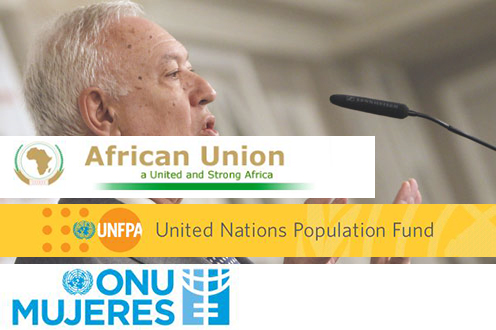The aim of the meeting was to tackle collaboration between partners to make progress on the agenda of women's rights at a global level, and particularly on the standards for gender equality contained in the Convention for the elimination of all forms of discrimination against women, the Beijing Platform for Action, Resolution 1325 and the new sustainable development goals.
In his speech, Minister García-Margallo remarked that the protection and promotion of human rights for women are a shared responsibility for all Member States of the United Nations. Gender equality and the empowerment of women are both catalysts for sustainable development, he argued, and are two of the key pillars for the implementation of the 2030 Agenda.
José Manuel García-Margallo recalled that non-discrimination on grounds of gender constitutes one of the priorities of Spanish foreign policy in relation to human rights, and as such has been included in the Strategic Plan for Equal Opportunities 2014-2016. Along these same lines, he referred to the leading role taken on by Spain in the United Nations Security Council, in the promotion of the Agenda for Women, Peace and Security, as well as the high-level open debate, to be organised by our country on 13 October, during Spain's presidency of the UNSC, to commemorate the 15th anniversary of the adoption of Resolution 1325 (2000).
The minister highlighted that in addition to completing the regulatory framework for women, peace and security to offer a response to the new challenges and threats, it is essential for Member States to take on national commitments to speed up its implementation.
José Manuel García-Margallo concluded his speech by recalling the need to improve the protection of girls and women in situations of conflict, strengthening the protection offered against sexual violence and other gender-based crimes suffered; to protect, given their particular vulnerability, certain groups of women such as human rights activists and indigenous women; to boost the role of women in preventive diplomacy and mediation, as well as their participation in peacebuilding processes; to strengthen the institutional architecture of the United Nations on issues of women, peace and security through the constitution of an informal group of experts that promotes the application of resolutions on the ground; to improve the flow of information on the ground; to strengthen the language used in all the documents issued by the UNSC on women, peace and security and its subsidiary bodies; to step up collaboration with civil society, particularly with those NGOs that act on the ground; and to mobilise the necessary resources.





